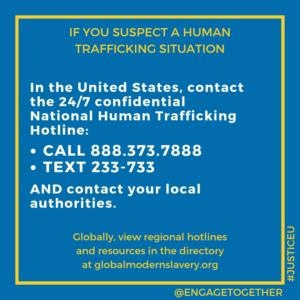While much may come to mind when you hear the term “rescue”, it is important to know that this moment in a victim’s life does not only include the immediate removal or exit from a dangerous situation but must also include immediate access to critical services that will meet their individual needs. Increasing the availability of these resources from within your community ensures that victims receive the instant care they need.
As people become AWARE and begin to properly IDENTIFY trafficking situations, those caught in sex, labor, or organ trafficking must be RESCUED, or else immediately supported if they are able to exit on their own. The AFRJ® defines Rescue efforts as both the moment someone is removed from (or is able to exit) trafficking as well as the wraparound services that are immediately needed.
The four categories that must be active in every community to be effective at assisting those in need include:
Intervention. It is the responsibility of law enforcement officials to intervene physically and remove victims from dangerous circumstances. However, communities are uniquely positioned to assist law enforcement in this process. In addition to reporting tips to local and national hotlines so that cases can be investigated and built, community members can reach out to their local law enforcement, or those organizations working closely with law enforcement, to learn how they can be most helpful.
Upon rescue, victims have many immediate and critical needs, including:
Temporary shelter. When a survivor is first rescued, they often need access to immediate and safe housing. Temporary shelters in your community may be a location designed solely for human trafficking survivors or may be a shared space within a domestic violence or homeless shelter. Options are often different for minors and may include therapeutic foster care homes. Temporary shelters are intended to be a short-term place where survivors can receive the stabilization resources and services needed as they develop a long-term plan.
Services. At the moment of rescue, many services may be needed such as medical, dental, legal, counseling, and more. Survivors may need immediate medical examinations and medications before or during their stay at a temporary shelter. For some survivors, there may be dental issues or an injury that needs to be addressed in the first few days or weeks. Survivors may be facing legal challenges and often need assistance navigating those issues such as outstanding charges, custody, or immigration. While long-term counseling is often offered as part of aftercare efforts, there may be instances where short-term counseling is needed. All of these services – and more – need to be available to victims upon rescue or exit.
Victim advocates. Victim advocates come alongside and link survivors to needed resources in the community as well as help them navigate the many systems and appointments that can be overwhelming and unfamiliar. Victim advocates may be provided through an agency, a shelter, or a trained civilian working for a program that offers case management to minors or adults, both foreign national and domestic.
Increasing the availability of these resources from within your community ensures that victims of human trafficking receive the instant care they need. This month, take time to learn what wrap around services are available in your community. Share with your network about gaps that they may be able to fill or ways they can come alongside law enforcement or existing programs.

- Sign up for Engage Together® emails sent right to your inbox
- Visit www.enagetogether.com/myrole for immediate ways to engage

